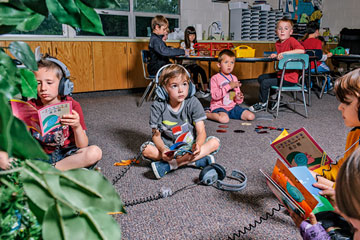
A group of Utah first-graders listen and read along in Mandarin.
(6 of 6)
The advantages of multilingualism in the senior population are especially important--and comparatively easy to measure. Cognitive neuroscientist Brian Gold of the University of Kentucky tested seniors in the 60-to-68 age group on several of the familiar task-switching tests and found that bilinguals were more accurate and also faster than monolinguals. When he scanned the subjects with functional magnetic resonance imaging while they worked, he also found that the bilinguals' brains were less rather than more active in the relevant regions than the monolinguals'. That's actually a good thing: greater activity means the brain is working harder, breaking a sweat it wouldn't have had to in its younger days. "Older people have to activate their brains more in general than younger people do," says Gold. "But bilingual seniors have to do it less." Bialystok has studied seniors suffering from serious age-related cognitive decline and those who are still high functioning and estimates that on average, bilinguals get an extra 4.1 years of clarity before symptoms of any form of dementia set in; those who develop Alzheimer's specifically get an extra 5.1 years.
None of that is to say that the monolingual middle-ager who is worried about dementia can simply take up a language and reap the same benefits a lifetime bilingual would. "The practical reality," says Gold, "is that adults are simply less likely than children to learn and continue to use a second language because they have to go far out of their way to do it, whereas it comes gift-wrapped for kids." At best, he says, language lessons in adulthood fall into the couldn't-hurt category--one more way to keep the aging brain active.
The children in the Utah grammar schools are, of course, thinking about none of this yet, with their brainpower and their language talents still on a steep upward arc. The incoming fifth-graders who have been with the program since its first year represent an educational vanguard, the leading edge of a living longitudinal study that renews itself each year as more and more families clamor for spots in the participating schools. The planned addition of 20 to 25 schools per year for the next five years should help satisfy that growing demand.
For the Utah teachers and kids, policy issues matter a lot less than the simple day-to-day richness of bilingual living. Third-grade French teacher Georgia Geerling had never taught below the level of community college and high school before she took a job at Morningside Elementary School, and she was not fully prepared for what the experience would be like. "When they hug me, I'm so touched," she says. "We had an assembly, and the kids were all onstage singing in French, and I just cried. They're so wiggly!" That's as fair a way of describing third-graders as any. But their restless bodies reflect equally active, playful, energetic brains. Learning the lyricism and the magic of another language can make them better brains too.
